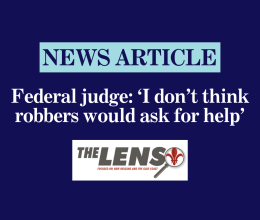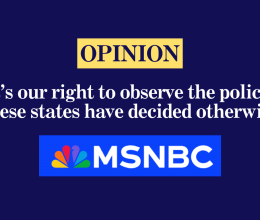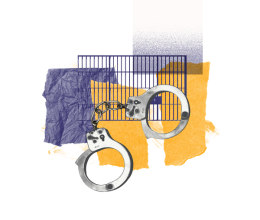"Louisiana’s Debtors Prisons: An Appeal to Justice" Documents Unlawful but Common Practice of Jailing People Too Poor to Pay
NEW ORLEANS – According to a new report by the ACLU of Louisiana, courts across Louisiana routinely jail people for no reason other than their inability to pay court-ordered fines, even though that practice was deemed unconstitutional more than thirty years ago. This practice often sends financially-stressed individuals into a downward cycle that they can't escape, as additional fines and jail time are added to already unaffordable costs.
"Jailing poor people simply because of their poverty has been illegal for decades," said Marjorie R. Esman, Executive Director of the ACLU of Louisiana. "Courts are required to hold hearings on the ability of a defendant to pay and are forbidden to force someone to choose between jail and a payment. Yet these practices happen every day across Louisiana. They do nothing to promote public safety, they are expensive to their communities, and they are against the law."
The ACLU sought records from twelve parishes and several municipalities across the state, seeking to determine the scope of this problem. In every community examined, poor people receive jail sentences either because they can't pay fines assessed against them for minor offenses such as traffic tickets, or because they are given a choice between paying a fine they can't afford and spending time in jail.
"These practices hurt communities by separating children from their parents, costing working people their jobs, and they lead to needless fear," said Esman. "Our communities pay a high price for treating poverty as a crime."
As one example among many, a man who had recently been hired for a new job appeared to make partial payment on a fine, with a promise to pay the balance after his first paycheck. For his inability to pay the full amount, he was jailed, which almost cost him the job he needed to pay off the balance of his debt. In another instance, a man ticketed for speeding was arrested when he couldn't pay his fine in full and in cash at his court hearing, although he had never been instructed that he would have to do so.
"People who can afford the fines assessed against them don't run the risk of incarceration, but those who can't are routinely jailed simply because they lack resources," continued Esman. "Yet in 1983 the U.S. Supreme Court ruled that judges must hold hearings to determine someone's ability to pay before assessing a fine. What is a minor expense to one person can be an insurmountable burden to someone else. In a free country liberty cannot be limited to those with more money."
In its report, the ACLU of Louisiana advises courts to follow the law, calling on judges to hold indigency hearings, create sliding scales of fines, impose meaningful community service instead of jail time, and advise defendants of their right to counsel if they face possible incarceration for unpaid fines. In addition, the ACLU asks for a "bench card" to remind judges in all courts across the state that jail is not a punishment for poverty.






